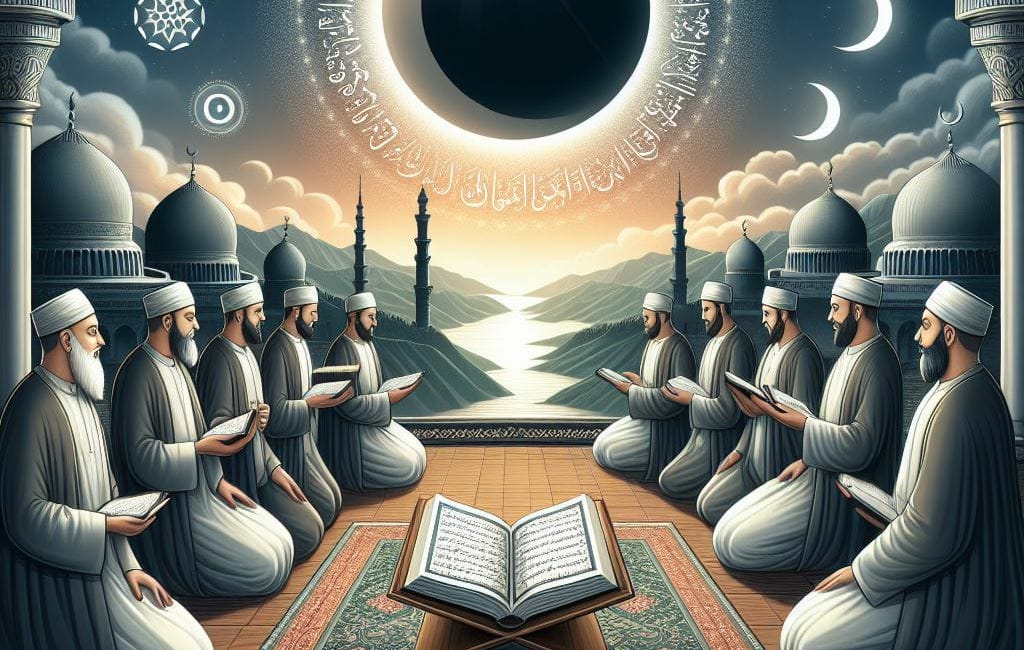Why God Allowed Imam 'Ali's Caliphate be Denied and Delayed
An Ismaili Answer to the Caliphate of the First Three Caliphs
Below is an interesting passage from a medieval Ismaili treatise, Paradise of Submission, on the situation after the death of the Prophet Muhammad(ﷺ) regarding his succession. Nasir al-Din Tusi, if indeed this section of this important Ismaili text was written by him, suggests that the denial or delay in the Muslim community’s recognition of Hazrat ‘Ali’s immediate right to the Caliphate and the subsequent designation of others to that position before its restoration to its rightful holder, i.e., Imam ‘Ali, was “not devoid of divine providence and wisdom.” Accordingly, just like the light of dawn is distinguished from the darkness of night which precedes the day, so too is the esoteric, true reality (haqiqat) distinguished from the exoteric, literal sense (zahir) of the religious law (shari‘at). Likewise, and for the same reason, the caliphate of the first three caliphs — the personification and embodiment of the exoteric and illusory similitudes — was established first so that the meaningful spiritual light of the Sun of Religion could then be seen as distinct from the darkness.
Excerpt from the Paradise of Submission
[Imam] ‘Alī’s mission as legatee (waṣāyat) of the Prophet’s will, was left so hidden and ambiguous for the community and majority of the followers of Islam (ahl-i millat) that after the death of the Prophet — peace be upon him and his progeny — both the elite and common folk found occasion to designate Abū Bakr to the caliphate by common consensus (ijmā‘). Following him, the business [of leadership] fell to ‘Umar and this [appointment] was not devoid of divine providence and wisdom which our lord [Imam] ‘Alī brought to bear [upon his leadership]. For it was necessary that the literal sense of the religious obligations (ẓāhir-i aḥkām-i sharī‘at), which is measured to the common domain of similitudes (‘umūm-i mushābahat) among the Prophet’s followers, be established first, so that subsequently the inner meaning and reality (ma‘nā wa ḥaqīqat) of those injunctions, which pertain exclusively to the special domain of spiritual discrimination (khuṣūṣ-i mubāyanat), could be introduced [by the Imams]. And it was necessary that certain persons exist to incarnate and personally embody that realm [of exoteric religion], and they [the caliphs Abū Bakr, ‘Umar and ‘Uthman] were just such people.
To strike a simile of the situation: night must first exist so that from it the dawn may break and the sun arise. In this regard, they [Abū Bakr, ‘Umar and ʿUthman] were like the night, whereas the likeness of Salmān [al-Farsi]1 — peace be upon him— was the dawn. [Thus, the Prophet said]: ‘Salmān is one of us, a member of the family (ahl al-bayt).2 Whoever recognises him is a believer and whoever denies him is an infidel.’3 The likeness of our lord ‘Alī — may salutations ensue upon mention of him — was as the sun. The authority [of Abū Bakr, ‘Umar and ‘Uthman] was the very essence of illusory similitudes (‘ayn-i mushābahat), whereas the authority of Salmān was a product of spiritual discrimination (athar-i mubāyanat), and of ‘Alī the quintessence of spiritual discrimination - nay, it was the authority of the very world of Divine Unity (ḥukm-i ‘ālam-i waḥdat-i ilāhī).
However, the adherents of Islam (ahl-i islām), aside from that elect company who followed ‘Alī, had become so swollen with pride and conceit about the caliphate of those individuals [the first three caliphs] that they could not appreciate the ideal standpoint (ghāyat) from which he administered the affairs of state, so that they — except those whom God so wished — did not support ‘Alī's leadership (imāmat) with full sincerity and faith. And when ‘Alī introduced [the light of spiritual] discrimination (mubāyanat) in the ambiguities of religious law (mushābahat-i sharī‘at), the opinions and the sympathies of the greater number of the Muslim community had solidified so much in favour of the plain exoteric [and] literal sense of religious law, and in support of Abū Bakr, ‘Umar and ‘Uthman — the personification of those prescriptions — that all those great disasters, which are recorded in history books and have not yet ceased, occurred.
Naṣīr al-Dīn Ṭūsī (with Ḥasan-i Maḥmūd]), Rawḍa-yi Taslīm, translated by S.J. Badakhchani as Paradise of Submission: A Medieval Treatise on Ismaili Thought, 155-156.
How You Can Show Your Support and Help Ismaili Gnosis in Publishing New Articles
IN CASE YOU MISSED IT
Salmān al-Fārsī, a Persian companion of the Prophet Muḥammad, is venerated in Shi‘ism for his defence of Imam ‘Alī’s right of succession to the Prophet and subsequent role in the conversion of Iran to Islam. For details, see Louis Massignon, Salmān Pāk: et les premices spirituelles de l'Islam Iranien (Tours, 1934), pp. 16-19; Corbin, Cyclical Time, pp. 74-76, 170-174; and H.M. al-Miṣrī, al-Ṣaḥābī al-jalīl Salmān al-Fārisī (Cairo, 1972), pp. 122-169.
In Qur’an 71:28, Hazrat Noah⁽ᶜ⁾ prays: “O my Lord, forgive me, my parents and he who enters my [spiritual] house as a believer, and believing men and believing women, and increase not the wrong-doers except in ruin.” A great wisdom in this verse is that some true mu’mins by attaining the perfection of faith, enter the spiritual and luminous house of their Prophet and become one of the people of his house, such as Salmān-i Fārsī, who had attained this rank (‘Allamah Hunzai, A Thousand Wisdoms, 17-18).
According to a Prophetic Tradition, Salmān-i Fārsī had the honour of being included among the pure Ahl-i bayt. This is such a practical reality that in it there cannot be any doubt. Thus the sun of light also rose in the pure personality of Salmān-i Fārsī and in this shining example, there is good news for mu’mins with high ambition. For this spiritual ascension and elevation is not limited only to Salmān-i Fārsī but it is that all-embracing favour which every mu’min can attain after effacing and annihilating himself in the light of guidance. Can there be any bounty in the Divine treasures from which one remains deprived? (15:21). You should study the Ḥadīth-i qudsī, which is related to obedience: “O the child of Adam! Obey me, I will make you like Myself...” (‘Allamah Hunzai, Coolness of the Eye, 31).










Did Imam Ali willingly accept Abu Bakr, Umar and Uthman's caliphate? If so, then that means Imam Ali's caliphate was not usurped by these 3 above as it's been said by many from Shia branches (including Ismailism).